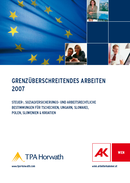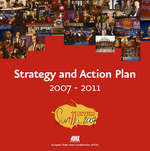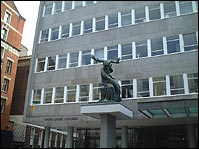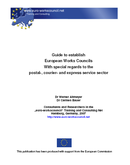 |
|
Welcome to issue no. 4 / 2007 of EWC News. 27th December 2007
|
|
The
training and consultancy network
"euro-workscouncil.net"
EWC
News appears four times a year.
You can find past issues in the newsletter archives.
|
|
1.
Interview with EU Social Affairs Commissioner Špidla
|
|
"I attach great importance to the work of European works councils"
Also the president of the European Commission José Manuel Barroso emphasized his determination for the revision of the EWC Directive on 13th November 2007 in a speech to the European Parliament. The official text for the consultation of social partners is expected to be decided by the European Commission in mid-January 2008. The European Trade Union Confederation (ETUC) has already convened an ad hoc meeting for 17th January 2008 to discuss the new situation. New EWC Directive: internal paper has been submitted to the EWC News
As already emerged in the last few weeks, the European Commission aims to meet key demands of the unions. If the employers' federations stick to their refusal and stay away from the negotiations, the internal paper of the European Commission will be regarded as rough draft of the text of the new EWC Directive. The following items are included:
The European Commission seems determined to put these regulations in force rapidly. It will be interesting to see whether the employers' federations maintain their denial and limit their scope by that. With the adoption of the EWC Directive in 1994 a negotiated settlement failed because of the British employers, while associations from Germany and other countries were open for a pragmatic solution with the trade unions. An EWC Directive negotiated between the social partners could, for example, provide for a joint arbitration board, which is preceded of a court action in case of disputes between EWC and central management. Many European works councils call for the revision
In the last few weeks, again a huge number of European works councils have written to the European Commission to emphasize the demand for a revision of the EWC Directive. Among them is the EWC of Alcatel-Lucent, which had failed in 2006 with the demand to renegotiate its EWC agreement due to the resistance of central management. Here is another example: |
|
2.
Fundamental rulings on the right to strike
|
|
3. New EWC
agreements
|
|
Soon three European works councils at Tyco
All three EWC agreements are subject to British law and provide for one annual meeting under the chairmanship of the employer. The employees' side elects a steering committee consisting of three members. Tyco takes the same route with the split as American Standard, where the EWC is also separated into three different bodies (see report in EWC News 1/2007).
After the takeover of the British utility Bristol Water by the Spanish group Aguas de Barcelona (Agbar), workers' representatives met on 22nd and 23rd November 2007 in the Catalan capital for the first time in order to prepare the establishment of an EWC (on the photo the Agbar Tower, headquarters of the group and new landmark of Barcelona). Not only a first draft for an EWC agreement was discussed, but also criticised the lack of a Spanish central works council. Labour law in Spain stipulates only local works councils compulsory. In Spain, there is also a significant delay in the establishment of European works councils. The following texts are available only in German:
On 13th December 2007, an EWC agreement was signed for Chevrillon Philippe Industrie (CPI) in Paris under French law. The CPI group is one of the largest book printers in Europe with approximately 4,000 employees in France, Germany, the UK, Czechia and the Netherlands and is owned by two financial investors. The employer had sought in the two years of negotiations to implement an EWC agreement below the subsidiary requirements of the EWC Directive, which rejected the employees’ side, however.
We have provided further EWC agreements on a special download page.
|
|
4. Participation in the SE
|
|
BASF sets participation standards
On 15th November 2007 an agreement on the participation in the future European Company (SE) was concluded for the chemical group BASF in Ludwigshafen (on the beginning of the negotiations see report in EWC News 2/2007). Thus the way is free to list the SE in the Company Register in early 2008. On 5th December 2007 the supervisory board, which consists only of twelve members, was already constituted. Half of them are workers' representatives. The existing European works council since 1995 will be replaced by a SE works council composed of 23 members from twelve countries.
On 19th November 2007, the Surteco SE has been listed in the Company Register. The group based in Buttenwiesen near Augsburg has 14 production facilities worldwide and supplies the furniture industry and others with paper and plastic parts. Both the structure of corporate governance (executive board and supervisory board) as well as employee participation in the supervisory board remain unchanged. Unlike a German public corporation with more than 2,000 employees, only a third of supervisory board seats will remain for employees, which represents a deterioration of German participation standards.
Resource companies on the way to SE
In September 2008 the metal wholesaler Klöckner from Duisburg decided to convert into a European Company (SE). Preparations are underway for the formation of the special negotiating body (SNB), which is to negotiate an agreement on participation and establishing an SE works council for 10,000 employees in 15 countries. |
|
5. Worldwide
social standards
|
|
6.
Activities of European works councils
|
|
On 21st to 23rd October 2007, employee representatives from nine countries met in Rimbo near Stockholm to discuss the revision of the EWC Directive and activities in the Baltic states and Poland. The meeting was organized by the Nordic Federation of banking, finance and insurance Unions (NFU). A comprehensive documentation of this meeting is available with us.
On 27th November 2007 at its meeting in Rome, the European works council of the U.S. hotel group Starwood (Sheraton, Westin, Le Méridien, St. Regis) signed an agreement with central management on financial aid in case of posting of employees to another EU country. They receive up to one month salary as a relocation assistance and the right to return within three months to their previous job. Starwood had established a European works council according to Belgian law in 2000.
European day of action at Unilever
|
|
7.
Merger challenge: recent examples
|
|
Mega-merger collapsed in the printing industry
On 7th November 2007 it became known that the Dutch printing group Roto Smeets de Boer wants to take over the European branch of the Canadian printing group Quebecor and thus become the largest European provider in the gravure and offset printing. The unions expected a massive staff reduction in the companies involved and accelerated restructuring across the industry.
On 23rd November 2007 at a special meeting in Barcelona, the EWC of Quebecor was informed on the new situation. Within two months, negotiations on the extension of the EWC agreement to the new company Roto Smeets Quebecor should begin. A meeting was scheduled in Amsterdam for 18th January 2008 in order to coordinate next steps of the employees' side. But then things turned out differently because the majority of the shareholders of Roto Smeets voted against the merger at the general meeting on 13th December 2007.
Division sale calls EWC into action
Turkey should be integrated into the EWC
A few days earlier, on 20th November 2007, a trade union network for the packaging division (Alcan Packaging) was founded in Istanbul. 19 workers' representatives from six countries were present, demanding the inclusion of the Turkish factory near Istanbul in the EWC. Switzerland is a non-EU country already represented in the EWC.
On 7th December 2007, the European Metalworkers' Federation (EMF) expressed concern about the announced acquisition of Aker Yards by the South Korean conglomerate STX. The shipyard group from Oslo employs 20,000 people in Norway, Finland, Germany (Wismar and Rostock), France, Romania and other countries. There is no European works council so far, which could be consulted in the merger case. |
|
8. Health Mapping as
an issue for the EWC
|
|
9. EWC research
|
|
Why are German works councils so reluctant in the EWC establishment?
The researchers led by Prof. Dr. Rainer Trinczek first checked the database of all recorded German companies covered by the EWC Directive and were able to update the database maintained for many years by the European Trade Union Institute in Brussels. They found for 2007 a total of 461 German companies in the scope of the EWC Directive, of which only 28% have established a European works council. For comparison: in Sweden there are already 48%, and in the UK, France, the Netherlands and Austria, about 40%. This means that Germany is twice at the top of the EU: no other country has such a large absolute number of existing European works councils, and no other country has so many not yet established European works councils.
The distribution by sector
The 461 German companies in the scope of the EWC Directive are distributed as follows among the individual sectors:
The
majority of European works councils already exist in the metal sector
(58 German companies), there is also the greatest backlog (143 German
companies). In second place follows wholesale and retail, where 49
German companies still have the EWC establishment ahead. The largest
percentage residue is at "other services" and in the transport sector.
The study shows across all industries: the larger the company, the
higher the probability that there is an EWC. Only in the service sector
there are companies with more than 10,000 employees without European
works council.
Reasons for scepticism about European works councils
The Munich researchers can find some reasons that may play a role for scepticism of works councils and managers in German companies:
The research project will run over two years, so final results are not expected before late 2008. More information is available on the following websites: |
|
10.
Interesting websites
|
| EU
legislation in the labour
and social law
On this informative website in eleven languages, explanations of the main acts of the European Union can be found. The texts are suitable for short and quick introduction to all areas of EU legislation. In a special chapter on social dialogue and employee representation there are acts on parentel leave, part-time work or temporary contracts as well as the most important Directives on participation.
With 160 employees, the training institution FNV Formaat based in Woerden near Utrecht offers a comprehensive program of seminars and consulting services for Dutch works councils. Also European works councils based in the Netherlands are supported by FNV Formaat, including with an EWC newsletter published several times per year in Dutch and English. FNV Formaat works with the Dutch trade union confederation FNV and is comparable with the DGB-Bildungswerk in Germany.
In early 2007, a EU-funded project started to build up trade union networks in northern Europe with focus on the Baltics. Transport unions from eight countries want to support international truck drivers. A website provides information in English.
The Netwerk Vlaanderen reveals on its website which of the big banks operating in Belgium violate environmental and social standards by their investment practices in other parts of the world. The focus is on business policy of Citibank, ABN Amro, Fortis, ING, Dexia, KBC, Axa, Deutsche Bank. A study of 11th December 2007 lists human rights violations. The Netwerk Vlaanderen promotes environmentally and socially responsible approach to money. We have compiled many other interesting links in a link collection.
|
|
11. Recent
publications
|
|
In October 2007, the Brussels-based Social Development Agency (SDA) presented a study on equal treatment of men and women. The authors go into the question of how to increase the presence of women in the bodies of employee representation and the role of European works councils in action on equal treatment for the workforce in Europe. To this end they present text examples in EWC and in anti-discrimination agreements, that have been concluded with the assistance of European works councils, such as in the energy company Areva.
Reingard Zimmer of the training and consultancy network "euro-workscouncil.net" had published in July 2007 an article on this topic in German in the magazine "Arbeitsrecht im Betrieb":
On 6th December 2007 the Chamber of Labour Vienna publised a booklet that gives a summary of the rights and obligations of employees in the countries of Hungary, Czechia, Slovakia, Poland, Slovenia and Croatia. On 164 pages the tax legislation and social security system in addition to labour law of each country is being presented. Austria is seen as a bridge between Western and Eastern Europe and has particularly strong contacts in the new and future EU member states. The following documents are only available in German:
On 7th December 2007 the European Trade Union Confederation (ETUC) in Brussels presented a booklet describing its strategy and action plan for the years 2007 to 2011. The action plan was adopted in May 2007 at the congress in Seville. The priorities are described on 156 pages: from social dialogue to employment and economic policy to strengthening the social dimension of the European single market. A separate chapter deals with the work of European works councils. The booklet is available in German, English and French.
In October 2006 the most comprehensive reform of the corporate law in the United Kingdom for 150 years came into effect. The new Companies Act requires managements in principle to consider the impact on employees, community and environment when making decisions and to be publicly accountable about it. Aim of the guide is to increase the success of British companies in social and environmental issues. The authors point to a number of ways to help the new law becoming a success through the use of shareholder rights, political campaigns and legal action. |
|
12. Training and consultancy
network "euro-workscouncil.net":
further examples of
our work
|
|
Cross-sector EWC seminar in Hamburg
Negotiations on the establishment of a European works council in the Frauenthal group will begin in January 2008. The group is run from Vienna and consists of eleven production facilities with approximately 3,000 employees in Austria, Germany, France, Portugal, Romania, Slovenia and Poland. The focus is in the manufacturing of components for commercial vehicles (springs, handlebars, catalysts) and in the plumbing and heating technology. With the help of the training and consultancy network "euro-workscouncil.net" first key issues were discussed from 14th to 16th November 2007 in Kassel for the upcoming negotiations. An important point is the adequate representation of all businesses in the future EWC.
Employee participation in port logistics
On 5th December 2007 the legal situation of British EWCs was discussed at the headquarters of the British TUC in London (photo). After a dispute in the ferry company P & O in 2002, whose backgrounds are currently being analyzed by the training and consultancy network "euro-workscouncil.net", there were no more court proceedings of a European works council on British soil. The unresolved question of the legal status of EWCs and significant financial risks have deterred the British trade unions since, said the EWC coordinator of the TUC, Sean Bamford (see interview in EWC News 3/2005). The completion of the report is planned for early 2008.
Restructuring in the rubber and plastics industry
New guide to the EWC foundation
Also recommendable is a contribution in German on the same topic in the economic lexicon for the works council, which is published by the Professors Thomas Blanke and Thomas Breisig:
Articles in professional journals
The German magazine Personalführung (personnel management) published two articles by Werner Altmeyer: in October 2007 on current developments in EWC consulting and in December 2007, a book review on participation in the European Company (SE). The acquisition of the Hilton hotel group by equity firm Blackstone illuminated an article in the October/November 2007 edition of the German magazine Mitbestimmung (codetermination).
Other publications can be found on our publications page.
On 21st December 2007, the latest edition of the German-Austrian EWC newsletter of ver.di and GPA appeared. It deals with the revision of the EWC Directive, several initiatives for the establishment of European works councils, the work of the ver.di department for utilities and waste management companies, European connections of GPA as well as protest calls against restructuring in Volksfürsorge and Novartis. Furthermore, a national report on the UK, seminar dates, meeting reviews and literature tips are included. The newsletter is produced by the training and consultancy network "euro-workscouncil.net" and published only in German. |
|
13.
Current seminar schedule
|
|
Registrations are possible for the following seminars and workshops to be held with our participation:
Works council activities in Europe -- The Euro Works Council (EWC)
Europe for trade union officers of IG Metall Institutions -- Policies -- European works councils 16 -- 18-04-2008 in Bad Orb 13 -- 15-10-2008 in Bad Orb
In-house events An overview of the topics for in-house events can be found here: → Topics for in-house seminars
|
|
14. Imprint
|
EWC
News is published by: Training
and consultancy network "euro-betriebsrat.de" GbR Von-der-Tann-Straße
4, D-20259 Hamburg www.euro-workscouncil.net (English) www.euro-ce.org
(French) Authors
collaborating on this
issue: Werner Altmeyer, Carmen Bauer, Heiner
Köhnen, Kathleen Kollewe, Reingard Zimmer Distributor
of the German
version: 9,396 readers Distributor of
the English version: 1,020 readers Distributor of
the French version: 686 readers Newsletter
archive: www.ewc-news.com
We
are always pleased to receive comments and suggestions in relation to
this newsletter as well as reports on your EWC activities. Please write
us at: info@euro-workscouncil.net
www.euro-betriebsrat.de (German)
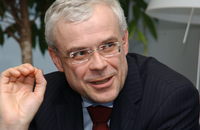

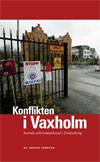


 New
EWC in the printing industry
New
EWC in the printing industry



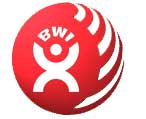 Trade
union federation developed new IFA model
Trade
union federation developed new IFA model





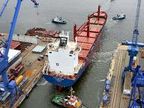
 Freudenberg starts exemplary project
Freudenberg starts exemplary project

 Health
and safety worldwide
Health
and safety worldwide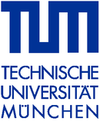


 EWC
information from the Netherlands
EWC
information from the Netherlands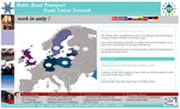

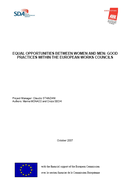
 Gender
equality as an EWC topic
Gender
equality as an EWC topic